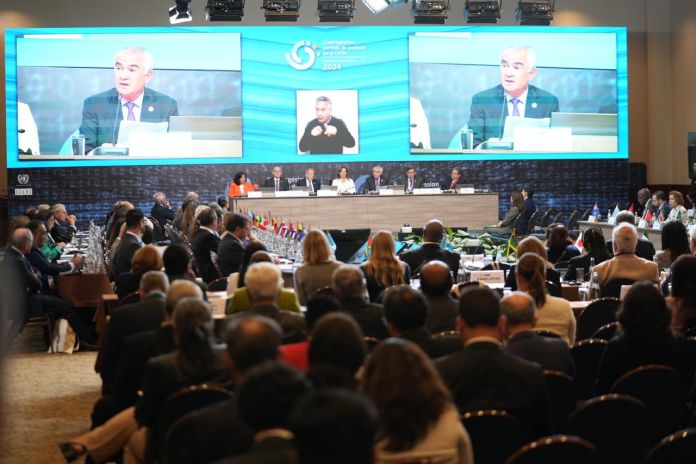- Advocated for urgent reform of the International Financial Architecture at ECLAC’s Meeting in Peru
LIMA, Peru – A dialogue of ministers of foreign affairs and high-level authorities took place in the framework of the United Nations regional organization’s Fortieth Session, which concludes this Friday, October 11.
In a context of multiple global crises, foreign ministers and senior authorities from Latin America and the Caribbean and other member countries of ECLAC ratified today their commitment to multilateralism, regional cooperation and implementation of the 2030 Agenda for Sustainable Development, and they reiterated the urgent need to reform the multilateral system and the international financial architecture so that this eminently middle-income region can access adequate financing for moving towards more productive, inclusive and sustainable development.
The Dialogue of Ministers of Foreign Affairs and High-level Authorities: Follow-up on the outcomes of the Summit of the Future and regional challenges in the lead-up to the Second World Summit for Social Development and the Fourth International Conference on Financing for Development was held on the first day of the Fortieth Session of the Economic Commission for Latin America and the Caribbean (ECLAC), which is taking place through Friday, October 11 in Lima, Peru.
In this segment, the foreign affairs ministers expressed appreciation for the space for debate provided by ECLAC, along with its historical contributions to the region’s development, and they welcomed the presentation of the position document Development Traps in Latin America and the Caribbean: Vital Transformations and How to Manage Them by the United Nations regional organization’s executive secretary, José Manuel Salazar-Xirinachs.
The foreign ministers and high-level authorities acknowledged the multiple challenges facing the region’s countries, including the persistence of poverty, food insecurity and social inequality, the increasingly severe impacts of climate change, growing political polarization, high levels of debt, and difficulties in accessing financing under favorable conditions. In response, they posed the need to strengthen regional integration, bolster social protection systems and make progress on productive transformation, climate resilience and gender equality, among other areas.
These country representatives also pointed up the recent approval of the Pact for the Future at the Summit of the Future organized by the United Nations (UN). ECLAC’s Session marks the first opportunity for the region’s countries to discuss regional implementation of the Pact for the Future, the Global Digital Compact and the Declaration on Future Generations, and how ECLAC’s proposals can contribute to this.
Furthermore, the senior officials stressed the importance of taking the region’s voice to the next international summits and conferences to be held, particularly the 16th Conference of the Parties (COP16) to the Convention on Biological Diversity, which will take place on October 21-November 1 of this year in Colombia; the Second World Summit for Social Development (Qatar, 2025); the Fourth International Conference on Financing for Development (Spain, 2025); and the 30th Conference of the Parties (COP30) to the United Nations Framework Convention on Climate Change (UNFCCC) (Brazil, 2025).
At the start of the dialogue, Elmer Schialer, minister of foreign affairs of Peru – the host country of the Fortieth Session and chair pro tempore of ECLAC in the 2025-2026 period – indicated that his country considers the recently approved Pact for the Future “to be a platform that will allow us, on what we deem to be a priority, to work together with other nations to address the challenges we share, such as the fight against poverty, protection of the environment and building a more just and equitable world economic order and international financial architecture for the benefit of developing countries.”
[…]
At the three-day regional meeting, authorities from ECLAC’s 46 Member States and its 14 associate members, along with representatives of the United Nations system and of non-governmental organizations, are debating about the region’s economic, social and environmental development, examining the activities carried out by the Commission the previous year, and setting the priorities for the programme of work that will guide the Commission’s future endeavours.





